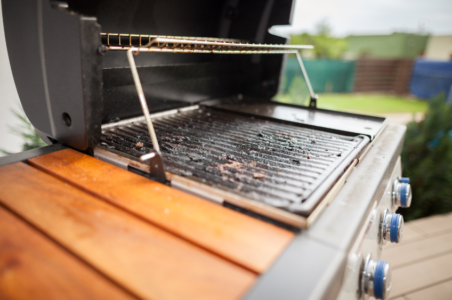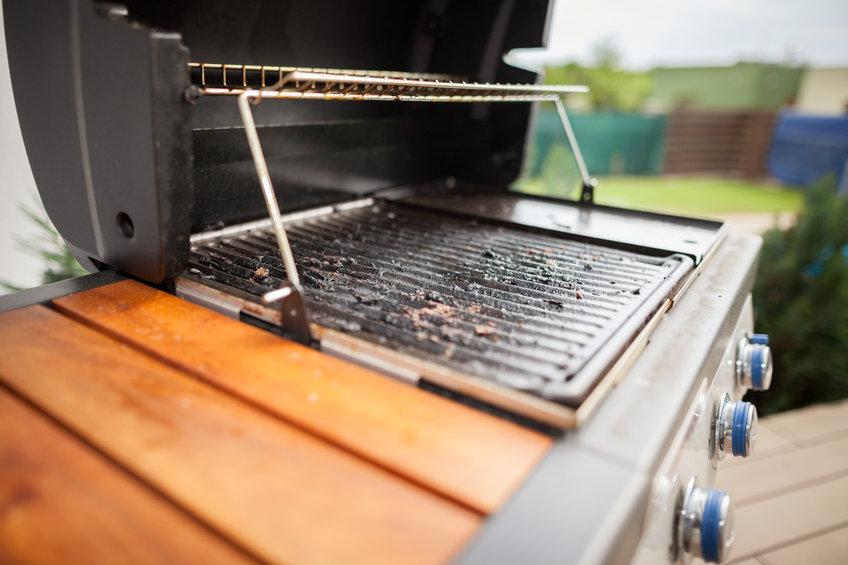
Many grill enthusiasts often find themselves grappling with tough grease and grime buildup on their gas grills.
When faced with this challenge, the idea of using oven cleaner may come to mind.
It is generally not recommended to use oven cleaner on a gas grill due to the harsh chemicals that can damage the components and leaves behind potentially harmful residues.
While there are many effective cleaning solutions specifically designed for grills, the method a person chooses can significantly impact the grill’s longevity and performance.
Alternatively, exploring natural cleaning methods or commercial grill cleaners can provide effective results without the risks associated with oven cleaner.
For those seeking an effective and safe cleaning solution, understanding the right products and methods tailored to gas grills is essential.
In this article, various safe options will be discussed, helping readers maintain their grills without compromising safety or performance.
Understanding the Components and Materials of Your Gas Grill
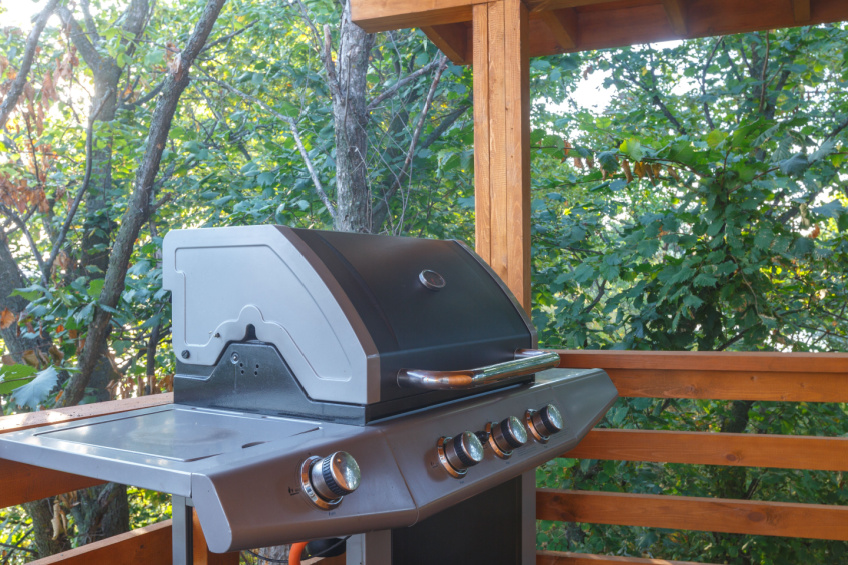
Gas grills consist of various components that determine their efficiency and longevity.
Recognizing the materials involved can help maintain them properly and prevent damage during cleaning.
Types of Gas Grill Grates
Gas grill grates play a crucial role in cooking, as they provide the surface for food.
The two most common types are cast iron grates and stainless steel grates.
- Cast Iron Grates: Known for excellent heat retention, they can deliver a superior sear. However, they require seasoning and can be prone to rust if not maintained properly.
- Stainless Steel Grates: These are popular for their resistance to rust and ease of cleaning. They do not retain heat as well as cast iron but are less demanding in terms of maintenance.
Prompt cleaning and care for these grates extend their lifespan and enhance grilling performance.
The Makeup of Common Cleaning Agents
When it comes to cleaning gas grills, many individuals consider various cleaning agents, including oven cleaner.
Oven cleaners typically contain sodium hydroxide, a powerful chemical that can break down grease and burnt food.
Sodium hydroxide is effective but can be caustic.
It’s essential to use it carefully on grill components.
Its strong formulation can quickly corrode materials like aluminum or painted surfaces, posing risks to the grill’s integrity.
Opting for milder cleaning solutions or homemade alternatives can prevent damage while still achieving a clean grill setup.
Understanding the components and materials ensures effective and safe maintenance practices.
Evaluating the Safety of Oven Cleaners for Gas Grills
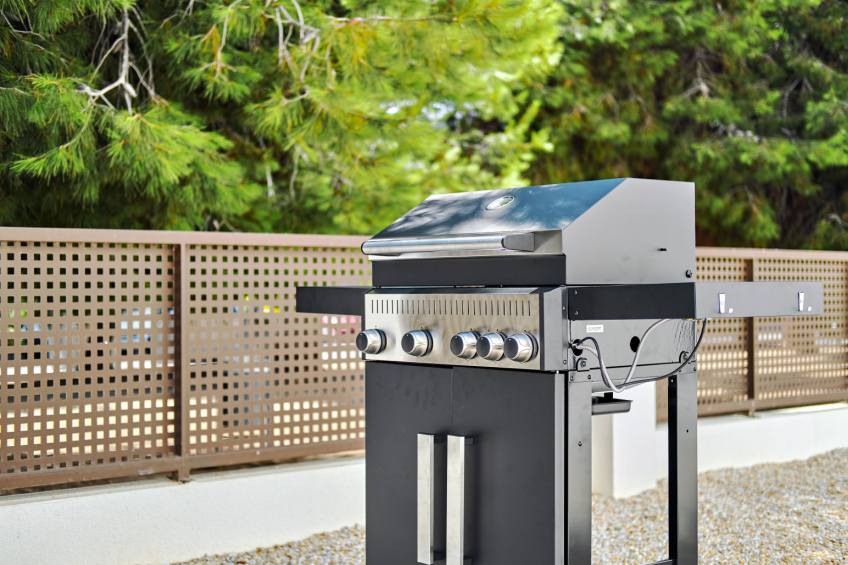
Using oven cleaner on a gas grill raises important safety considerations.
It is essential to assess the toxicity and chemical composition of these cleaners, as well as to implement proper ventilation and protective gear during use.
Toxicity and Chemical Composition
Oven cleaners often contain strong chemicals, such as sodium hydroxide and various solvents.
These substances can produce harmful fumes that pose risks when inhaled.
When choosing a cleaner, the user should check the label for warnings about toxicity.
Some cleaners may be designed for heavy-duty tasks and can be particularly caustic, making them unsuitable for cleaning grills.
If an oven cleaner produces toxic fumes, it is vital to avoid contact with skin.
Rubber dishwashing gloves are recommended to prevent burns or irritation.
Understanding the chemical nature of the cleaner ensures that the user makes an informed decision about its application.
Proper Ventilation and Protective Gear
Proper ventilation is critical when using oven cleaner to prevent harmful fume accumulation.
The user should always work outdoors or in a well-ventilated area.
Opening windows or using exhaust fans can help disperse fumes, reducing the risk of respiratory irritation.
It is advisable to keep children and pets away from the area while the cleaning takes place.
In addition to gloves, wearing a face mask can shield the user from inhaling any toxic particles.
Depending on the cleaner used, goggles may also be beneficial to protect the eyes from splashes.
These safety precautions significantly reduce the risk associated with using oven cleaners on gas grills.
Alternative Cleaning Methods for Gas Grills
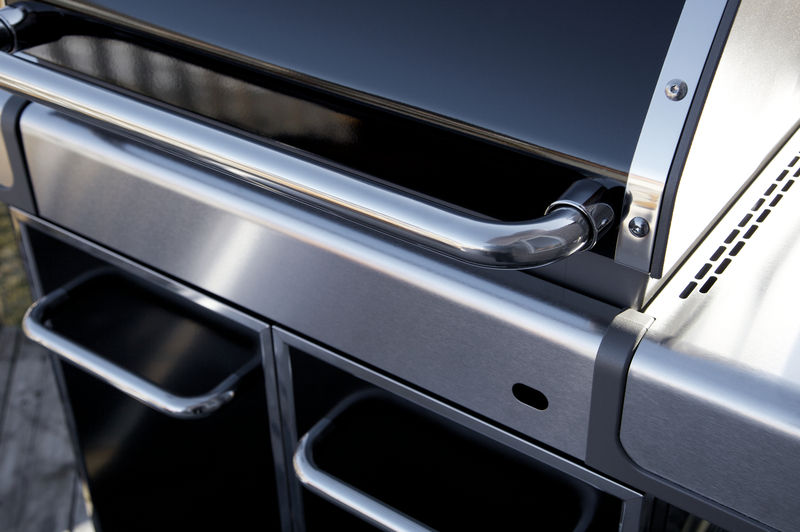
Exploring different cleaning methods for gas grills helps maintain their performance and longevity.
Many natural and mechanical options are effective and safer than conventional cleaners.
Natural Solutions for Grill Cleaning
Natural solutions are an eco-friendly way to clean gas grills.
Vinegar is a popular choice due to its acidity, which breaks down grease and grime.
A combination of vinegar and baking soda creates a powerful cleaning paste.
When combined, these two ingredients fizz and lift away stubborn residue.
Another effective cleaning agent is lemon juice.
Its natural acidity helps to cut through grease while leaving a fresh scent.
Applying these natural solutions can often be achieved with minimal scrubbing.
For a simple method, mix equal parts vinegar and water in a spray bottle.
Spray the grill surfaces and let it sit for 10-15 minutes before wiping down.
Mechanical Methods for Residue Removal
Mechanical methods provide an effective approach to removing stubborn residues.
A wire brush is a common tool, allowing users to scrub grates effectively.
It is essential to choose a brush designed specifically for grills to avoid damaging surfaces.
A scraper can also be very useful for getting rid of charred bits and buildup on grates.
This method is efficient for tough spots that require extra attention.
Using a pressure washer is another option, especially for a deep clean.
It can remove dirt and grease quickly, though care must be taken to avoid damaging the grill parts.
Always follow manufacturer guidelines when using such equipment to ensure the grill’s integrity remains intact.
Step-by-Step Process for Cleaning Your Gas Grill
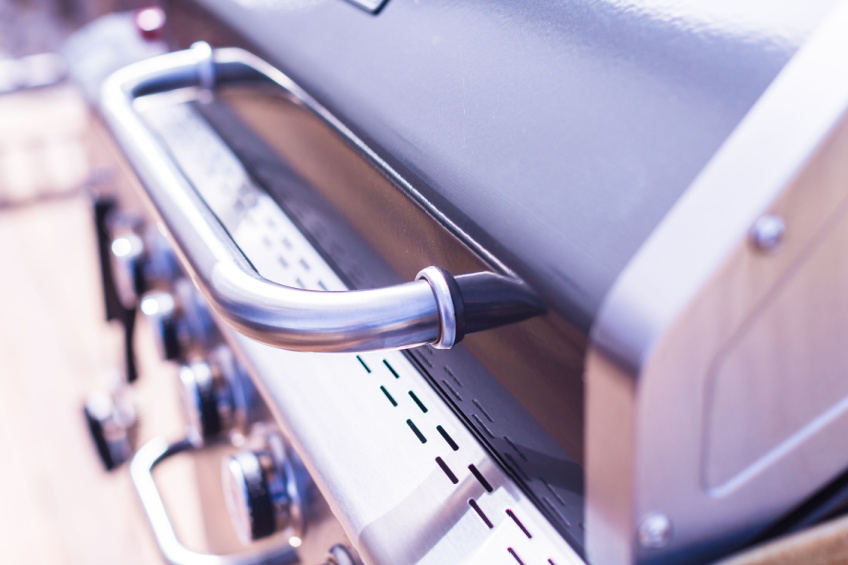
Cleaning a gas grill effectively involves several key steps.
Following this process will help ensure that all food residue and baked-on grease are removed, leaving the grill in optimal condition.
Pre-Cleaning Preparations
Before starting the cleaning process, ensure the grill is cool.
Disconnect the propane tank for safety and remove the grates and burners.
A grill brush is useful for scraping off loose debris.
It’s recommended to soak the grates in hot soapy water made with dish soap for at least 30 minutes before scrubbing.
This breaks down food residue and makes it easier to clean.
Don’t forget to inspect the propane lines for leaks and ensure the burners are functioning properly.
Degreasing and Residue Removal
After the pre-cleaning preparations, attention turns to degreasing.
Consider using an effective cleaning method, such as a commercial product like the Citrus Grill Cleaning Kit, or a simple homemade solution of vinegar and water.
The CitruSafe Grill Cleaning Kit offers a dependable and safe option for maintaining your grill.
It includes a 16-ounce bottle of CitruSafe BBQ Grill Cleaner along with a sturdy grill scrubber featuring three replaceable pads.
Utilizing the natural degreasing properties of citrus (d-Limonene), this cleaner efficiently tackles burnt food and grease, making it perfect for gas grills, charcoal grills, smokers, ovens, and microwaves.
Spray the cleaner generously on the grill surfaces, focusing on areas with baked-on grease.
Allow the solution to sit for about 10-15 minutes to penetrate and dissolve the grime.
With the grill brush, scrub the grates and surfaces using firm, even strokes.
A combination of circular and back-and-forth motions can effectively lift stubborn residue.
For the burners, a damp cloth can be used to remove any buildup gently.
Final Rinsing and Drying
After scrubbing, it’s important to rinse the grill thoroughly.
Use a hose or a damp cloth to remove any remaining cleaning solution and debris.
Ensure that all surfaces are rinsed well, as leftover soap can affect cooking next time.
Once rinsed, dry the grill completely with a clean towel.
This prevents water spots and helps prepare the grill for storage or the next cookout.
Reassemble the grates and burners once everything is dry to finish the cleaning process.
Best Practices for Regular Grill Maintenance
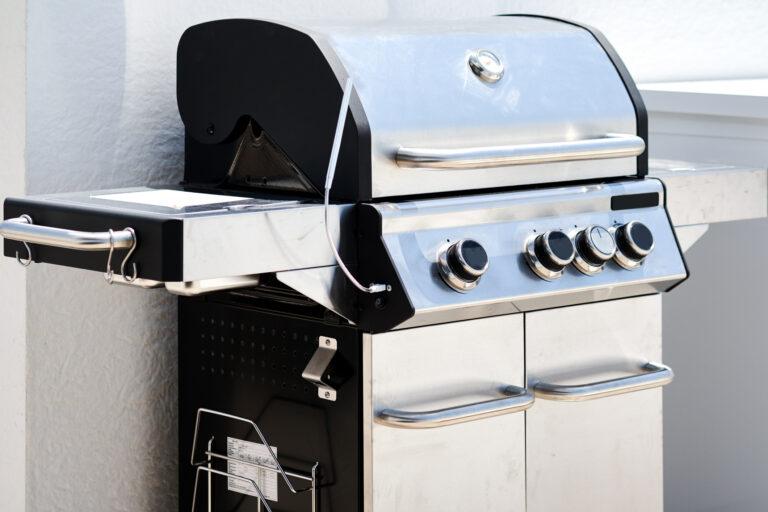
Regular maintenance ensures the grill operates efficiently and safely while extending its lifespan.
Key practices focus on consistent cleaning, addressing tough stains promptly, and scheduling deep cleans during the year.
Routine Cleaning after Use
Cleaning the grill after each use is essential for maintaining its condition.
This should begin with turning off the grill and allowing it to cool.
A thorough scrubbing of the grates using a wire brush ensures food remnants are removed.
After brushing, it is beneficial to wipe down surfaces with a damp cloth or sponge.
This helps to eliminate any grease and debris accumulated during cooking.
Additionally, removing and cleaning the grease tray prevents buildup, reducing fire hazards.
A light coating of cooking oil on grates can also create a non-stick surface for the next grilling session.
Following these practices enhances cleaning efficiency and keeps the grill in top shape.
Addressing Stubborn Stains and Grease
Stubborn stains and grease may require more focused attention.
When faced with difficult residues, a paste made from baking soda and water can be effective.
This paste should be applied to the affected areas and allowed to sit for 15-20 minutes.
Afterward, scrubbing with a non-abrasive sponge helps lift the stains without damaging the grill’s surface.
For burnt-on grease, white vinegar can be used as a natural degreaser.
Spray it on, let it sit for a few minutes, and wipe clean.
It’s crucial to avoid harsh chemicals, as these can damage the finish.
Regularly addressing stains prevents them from becoming permanent and ensures a clean grill for every use.
Seasonal Deep-Cleaning Recommendations
Conducting deep cleans seasonally contributes significantly to grill maintenance.
During these thorough cleaning sessions, the entire unit should be disassembled where possible for a more detailed inspection.
Start by cleaning the burners and inside the cabinet to remove dust and cobwebs.
A mixture of warm, soapy water works well for wiping down the exterior surfaces.
Inspecting and replacing any worn parts is also vital for safety.
Additionally, checking for gas leaks using a soapy water solution helps ensure safe operation.
This comprehensive approach keeps the grill clean and ensures its longevity and performance through regular use.
Selecting the Right Cleaning Tools and Products
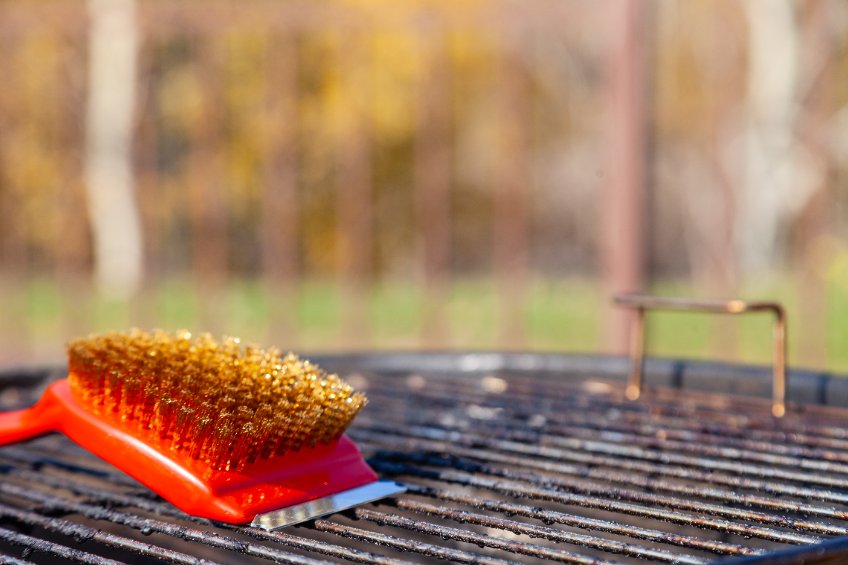
Choosing the appropriate tools and products for cleaning a gas grill is essential for effective maintenance.
Proper selection can enhance the cleaning process, ensuring that the grill remains in good condition without damage.
Brushes, Scrubbers, and Cleaning Solutions
A variety of brushes and scrubbers are available for grill cleaning.
Common options include wire brushes and nylon scrubbers.
Wire brushes are ideal for tough residue on grates but should be used with care to avoid scratching.
In contrast, nylon scrubbers are gentler and suitable for porcelain-coated grates.
When selecting a grill brush, ensure it has sturdy bristles and a comfortable grip.
Scrapers can also remove larger debris effectively and are useful for scraping the grill surface without scratching.
For cleaning solutions, oven cleaners can be effective but must be used cautiously due to their strong chemicals.
It’s crucial to ensure that any cleaner is safe for the grill material.
Always follow the manufacturer’s instructions for the best results.
When to Consider Professional Cleaning Products
In some cases, standard cleaning tools and household products may fall short.
Professional cleaning products are formulated to tackle tough grease and grime effectively.
These products often feature advanced chemical formulations that can break down stubborn residues.
When considering professional options, look for products labeled safe for grills.
Ensure the product can handle the specific materials of the grill to prevent damage.
Investigating the ingredients in these cleaners is vital to avoid chemicals that could harm the grill or the environment.
Professional-grade cleaners often come with detailed instructions, ensuring that users can achieve optimal cleaning results without risking damage.

